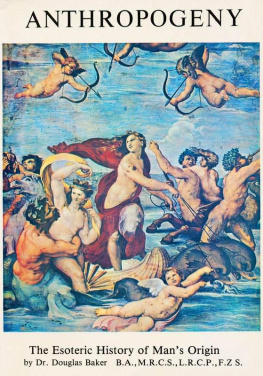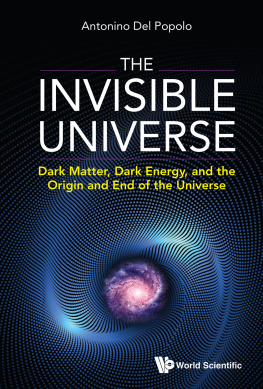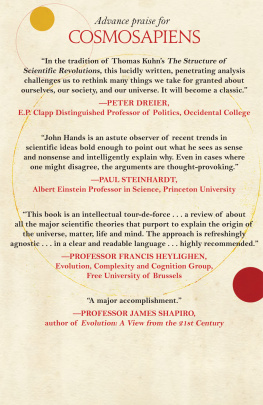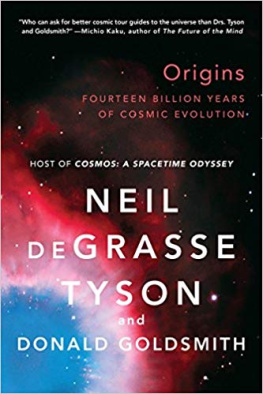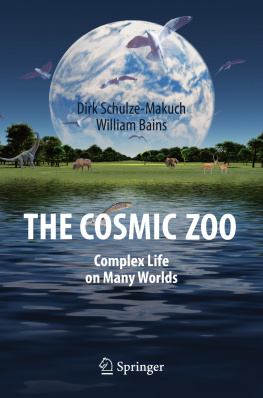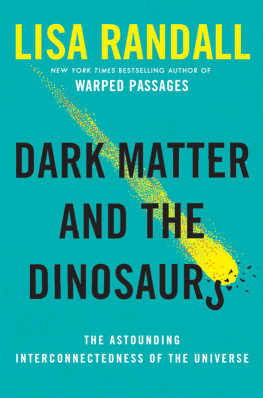Douglas M. Baker - Anthropogeny: The Esoteric History of Mans Origin
Here you can read online Douglas M. Baker - Anthropogeny: The Esoteric History of Mans Origin full text of the book (entire story) in english for free. Download pdf and epub, get meaning, cover and reviews about this ebook. year: 1975, publisher: D.M.Baker, genre: Science. Description of the work, (preface) as well as reviews are available. Best literature library LitArk.com created for fans of good reading and offers a wide selection of genres:
Romance novel
Science fiction
Adventure
Detective
Science
History
Home and family
Prose
Art
Politics
Computer
Non-fiction
Religion
Business
Children
Humor
Choose a favorite category and find really read worthwhile books. Enjoy immersion in the world of imagination, feel the emotions of the characters or learn something new for yourself, make an fascinating discovery.
- Book:Anthropogeny: The Esoteric History of Mans Origin
- Author:
- Publisher:D.M.Baker
- Genre:
- Year:1975
- Rating:5 / 5
- Favourites:Add to favourites
- Your mark:
- 100
- 1
- 2
- 3
- 4
- 5
Anthropogeny: The Esoteric History of Mans Origin: summary, description and annotation
We offer to read an annotation, description, summary or preface (depends on what the author of the book "Anthropogeny: The Esoteric History of Mans Origin" wrote himself). If you haven't found the necessary information about the book — write in the comments, we will try to find it.
Anthropogeny: The Esoteric History of Mans Origin — read online for free the complete book (whole text) full work
Below is the text of the book, divided by pages. System saving the place of the last page read, allows you to conveniently read the book "Anthropogeny: The Esoteric History of Mans Origin" online for free, without having to search again every time where you left off. Put a bookmark, and you can go to the page where you finished reading at any time.
Font size:
Interval:
Bookmark:
by
Dr. Douglas Baker
B.A., M.R.C.S., L.R.C.P., F.Z.S.
SECOND EDITION
Printed Edition ISBN 9780906006030
Copyright 1975 Dr. Douglas M. Baker
Little Elephant,
High Road, Essendon,
Herts, AL9 6HR,
England.
This is the only authorised eBook of the printed edition.
eBook ISBN 9781901754292
Copyright Dr. Douglas M. Baker 2011
Many audio lectures and some of the images and charts used here can be downloaded in higher definition for free from our website www.douglasbaker.org . Lecture DVDs, our correspondence course and printed books are also available at www.douglasbaker.com .
This book is sold subject to the condition that it shall not, by way of trade or otherwise, be lent, resold, hired out, or otherwise circulated without the publisher's prior consent in any form, binding or cover other than that in which it is published and without a similar condition including this condition being imposed on the subsequent purchaser.
Dedicated with Gratitude to
HELENA PETROVNA BLAVATSKY
Front Cover:
THE TRIUMPH OF GALATEA
Raphael's most celebrated secular creation, it forms part of a series of mythological frescoes undertaken in 1511-12 and based on Poliziano's poem Giostra. Both Guilio Romano and Sebastiano del Piombo assisted Raphael on the adjacent frescoes.
Some say that all gods and all living creatures originated in the stream of Oceanus which girdles the world.*
Galatea was one of the sea nymphs. She was courted by the cyclops Polyphemus whom she rejected for the herdsman Acis.
The picture was chosen for the cover because Galatea's triumph represents here the release of material forms into the world through the agency of water. The part played by the sea and by deluges have been supreme in the history of Man's origin. The sea has governed the rise and fall of continents, and, with them, their root races. The last great surviving island of Atlantis was not called Poseidon without good reason. The sea has swept aside civilisations like Lemuria and Atlantis. Salt water, fresh water, drought and condensation have been the instruments whereby the nereids have triumphed in the unending saga of Man's pleomorphism.
* The Homeric and Orphic Creation Myth from THE GREEK MYTHS by Robert Graves.
I have tried as far as possible to avoid a repetition of facts and figures given by The Secret Doctrine except where these are important in elucidating, confirming, contradicting or supporting some point of new detail. When H.P. Blavatsky wrote The Secret Doctrine, the great biological periods which we know so well today were not yet clearly defined in terms of age and extent. Also, by her own admission, many figures given by the Masters to her were inevitably altered in the process of being passed on to others like A. P. Sinnett for publication. Instead of loosely referring to time in terms of Rounds and Chains, Root Races and Sub-races, I have endeavoured by correlation, cross-checking and by final resort to questioning the Master Blavatsky directly, to give wherever possible time factors in terms of years, eras and periods. This has not been easy and may not always stand the closest of inspection, but it must be remembered that in eighty per cent of our investigations here, we are dealing with paralleling evolutions sometimes on three different planes at once. The march of science will steadily bring confirmation of broad outlines, correct minor errors, and add supplementary detail.
When it is also remembered that globes and their entire contents, including fossil records, are constantly either materialising into greater concretion or density, and later emerging into more refinement of mass and less concretion, and that the influence of human presence on artifacts makes carbon dating, for them, unsuitable, we have a picture requiring existential approach, and that is, bearing in mind the inner rounds and evolutions, exactly as it should be.
Annie Besant, herself gifted with clairvoyant perception, nevertheless had great difficulty in fixing time in her observations of Man's early history:
With regard to the fixing of ancient dates, I find myself wholly incompetent. It is easy to observe the co-presence of man and certain types of animals on the globe, but this gives little help in fixing precise dates. I have in this followed The Secret Doctrine, because every little advance I have made in knowledge has proved to me the general accuracy of that marvellous book, and H.P.B. had a sweep and grasp of occult knowledge which none among us can pretend to rival.*
* The Pedigree Of Man by Annie Besant (Theosophical Publishing House, London), page 14.
To this last observation let me hasten to add my own amen. No man can hope to possess all the knowledge which concerns our very complicated origin on this planet (and on others). Madame Blavatsky, in introducing The Secret Doctrine reiterated the words of Montaigne :
Gentlemen, 'I have here made only a nosegay of culled flowers, and have brought nothing of my own but the string that ties them.'
Annie Besant, who followed The Secret Doctrine with her The Pedigree Of Man, wrote in the same vein:
At the very outset, I would acknowledge my debt to her great work, THE SECRET DOCTRINE, from which the whole plan and innumerable details are taken; I have added some facts, filled up some lacunae, bridged some gulfs, perhaps, but most of the materials are hers, and are drawn from that record of her vast occult knowledge, her giant grasp of facts.
Later, Alice Bailey dedicated her magnum opus, A Treatise On Cosmic Fire, to the same source:
That great disciple who lighted her torch in the east and brought the light to Europe and America in 1875.
Let me be permitted to add my own less illustrious name to these, and with them testify that the teachings are from the WISDOM OF THE AGES as they are channeled by Masters of the Wisdom to mankind perennially, and it is for Their disciples to interpret them to the intelligentsia in the language of the day.
All men agree that no subject is as abstruse and complicated as that of medicine. And this science, more than any, has been built up through respect for earlier teachings and medical traditions so much so that even today, at least in Great Britain, doctors prefer to hand their knowledge and experience to their own sons rather than to allow 'outsiders' to take up their work. In Greece even the Aesculapidae, fathers of modern medicine, leaned heavily on the teachings of the ancients and preserved them jealously within their own ranks.
One of the most astute minds in history, the Arab scientist and philosopher Rhazes, paid this tribute to ancient learning:
It can never be that any individual, to whatever age he may reach, should be able to comprehend in his mind a subject so vast and diffuse (as medicine), except by treading upon the footsteps of the ancients.
In our times physics too has leaned heavily on work done by Kepler, Galileo and Newton, right up to Rutherford. If we think that men of science are exempt from this holistic and symbiotic approach to true knowledge and wisdom, then the comments of two of our greatest physicists are relevant here. Sommerfield, the younger of the two, had taken up the threads of work done by the older. Sommerfield to Max Planck :
You cultivate the virgin soil,
Where picking the flowers was my only toil.
And to this Planck answered :
You picked flowers - well, so have I.
Let them be, then combined;
Let us exchange our flowers fair,
And in the brightest wreath them bind.
The study and comprehension of medicine, difficult, arduous and exacting as it is, is like a tea party compared to the study of Man's origin, and without the ancient teachings science has no hope of unraveling anthropogenesis.
Font size:
Interval:
Bookmark:
Similar books «Anthropogeny: The Esoteric History of Mans Origin»
Look at similar books to Anthropogeny: The Esoteric History of Mans Origin. We have selected literature similar in name and meaning in the hope of providing readers with more options to find new, interesting, not yet read works.
Discussion, reviews of the book Anthropogeny: The Esoteric History of Mans Origin and just readers' own opinions. Leave your comments, write what you think about the work, its meaning or the main characters. Specify what exactly you liked and what you didn't like, and why you think so.

